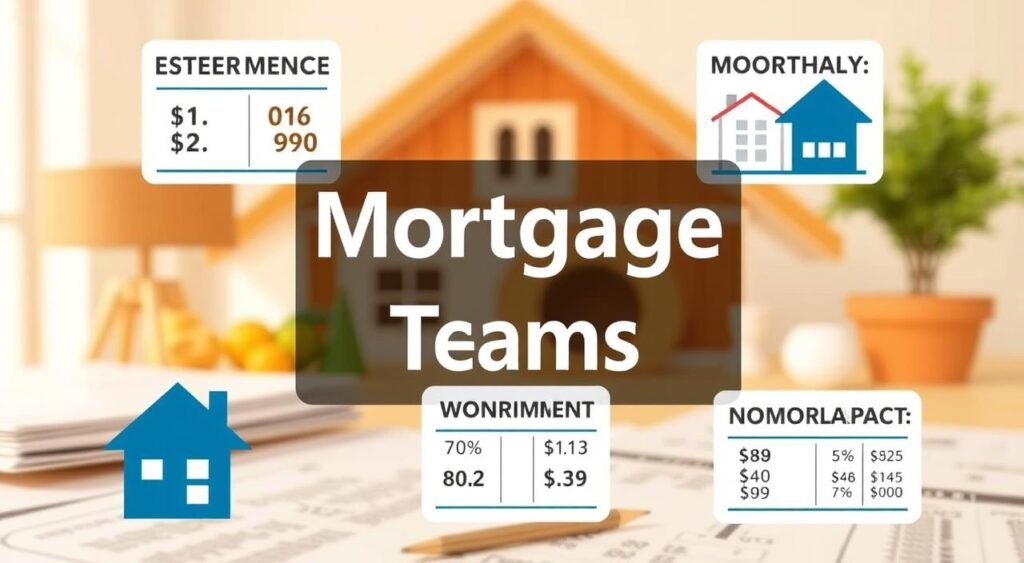Mortgage Loan Terms: Getting a mortgage loan is a big financial step. You need to know about the different loan terms and how they affect you. Loan terms set the length and rules of your home loan. They decide your monthly payments, interest rates, and the total cost of owning a home.
Whether you’re buying your first home or have owned one before, understanding mortgage terms is key. It helps you make choices that fit your financial plans.
Key Takeaways
- Mortgage loans can be classified into short-term (less than 10 years) and long-term (15- and 30-year) options.
- Loan term length affects monthly payments, with shorter terms resulting in higher payments but less total interest paid.
- Understanding loan terms, such as repayment period, interest rates, and associated fees, is essential for negotiating favorable mortgage terms.
- Borrowers can compare loan offers from multiple lenders to find the best option for their financial situation.
- Mortgage rates have fluctuated significantly in recent years, impacting the overall cost of homeownership.
Understanding Basic Mortgage Loan Terms
Mortgage loan terms are important for borrowers to know. They include the principal, which is the amount borrowed, and interest, the lender’s fee. Also, mortgage terms cover taxes and insurance, known as PITI (Principal, Interest, Taxes, and Insurance).
The Role of Principal and Interest
The principal is the amount you must repay. Interest is the lender’s fee for the loan. Knowing how principal and interest work is key to figuring out your monthly mortgage payment and the loan’s total cost.
Common Types of Mortgage Terms
- Fixed-rate mortgage: This mortgage loan has the same interest rate for the whole loan. It offers stable monthly payments.
- Adjustable-rate mortgage (ARM): ARMs have interest rates that change with the market. This can lead to changes in your monthly mortgage payment over time.
- 15-year, 20-year, and 30-year mortgage terms: These are how long you have to repay the mortgage loan. Shorter terms have lower interest rates but higher monthly payments.
Knowing these key terms helps borrowers make smart choices about their home loans. It’s important for their long-term financial plans.
| Mortgage Term | Interest Rate | Monthly Payment | Total Interest Paid |
|---|---|---|---|
| 15-year fixed | 4.5% | $1,500 | $70,000 |
| 30-year fixed | 5.5% | $1,100 | $145,000 |
| 5/1 ARM | 3.8% | $1,200 | $90,000 |
This table shows how different mortgage terms compare. It highlights the choices between monthly payments, interest rates, and total interest over the loan’s life.
How Different Loan Term Lengths Impact Your Payments

The length of your mortgage loan term greatly affects your monthly payments and total interest. Shorter terms, like 15 years, mean higher monthly payments but less interest paid. Longer terms, such as 30 years, have lower monthly payments but more interest costs.
For instance, a $200,000 loan at 6% interest would have a $1,687.71 monthly payment for 15 years. For 30 years, it’s $1,199.10. The total interest paid over 15 years is $103,788, and over 30 years, it’s $231,676. This shows how term length can change your loan balance and loan payment costs.
When getting a mortgage, think about the pros and cons of different loan program options and mortgage point structures. Shorter terms might be better for those who can handle higher payments. Longer terms offer lower monthly costs but more interest over time.
| Loan Term | Loan Amount | Interest Rate | Monthly Payment | Total Interest Paid |
|---|---|---|---|---|
| 15-year | $200,000 | 6% | $1,687.71 | $103,788 |
| 30-year | $200,000 | 6% | $1,199.10 | $231,676 |
The loan term you pick should match your financial goals and budget. Think about your long-term plans for buying a home. Talk to a mortgage expert to find the best loan program for you.
Essential Mortgage Loan Terms and Conditions

It’s key to know the basics of a mortgage loan, especially for home buyers. This includes understanding fixed-rate and adjustable-rate options. Knowing about loan agreements and closing costs helps you make smart choices and get good deals.
Fixed-Rate vs. Adjustable-Rate Options
Choosing between a fixed-rate and an adjustable-rate mortgage affects your payments. Fixed-rate loans keep the same interest rate, offering stability. Adjustable-rate loans, however, can change, leading to varying payments.
Important Loan Agreement Elements
Look closely at the annual percentage rate (APR) in a loan agreement. It includes the interest rate and fees. Also, know about closing costs like origination fees and title insurance. Prepayment penalties and other fees are important too, as they can affect the loan’s cost.
Understanding Closing Costs and Fees
Closing costs are 2% to 5% of the loan amount and include many fees. These can be appraisals, title insurance, and attorney fees. By understanding these costs, you can plan better and possibly get a better deal. Talking to the lender or looking into usda loan options might also help lower costs.
| Loan Type | Typical Repayment Term |
|---|---|
| Mortgage | 15 to 30 years |
| Car Loan | Around 5 years |
| Federal Student Loan | 10 years |
Knowing about different loan terms helps you choose the right one. This choice affects your monthly payments and fits your financial goals.
“Negotiating loan terms and conditions with the lender is possible and can lead to significant savings.”
Whether you’re buying a home or refinancing, understanding mortgage loan terms is vital. It helps you get the best cost of the loan.
Making Informed Decisions About Your Mortgage Term

When you get an fha mortgage, the terms and conditions matter a lot. They affect your financial future. Knowing about mortgage terminology and your mortgage term is key. Think about your financial goals, budget, and future plans to choose wisely.
Consider the mortgage term length. Shorter terms like 15-year mortgages have lower rates but higher payments. This means you pay off your loan faster and save on interest. Longer terms, like 30-year mortgages, have lower payments but a bigger mortgage balance over time. Choose based on your budget and property plans.
Also, think about the mortgage type. Fixed-rate mortgages have stable rates, while adjustable-rate mortgages (ARMs) might change. Knowing these differences helps you pick based on your financial goals and risk level.
Looking at different mortgage transaction offers from various lenders is smart. Compare rates, closing costs, and fees to find the best fit. Also, understand how extra payments and refinancing can affect your finances.
By carefully considering these points, you can choose the right mortgage term. This sets you on a path to homeownership with confidence and financial stability.
| Mortgage Term | Interest Rate | Monthly Payment | Total Interest Paid |
|---|---|---|---|
| 15-year Fixed | 4.50% | $1,432 | $77,760 |
| 30-year Fixed | 5.00% | $1,073 | $186,280 |
“Choosing the right mortgage term can have a significant impact on your long-term financial well-being. It’s essential to weigh all the factors and make a decision that aligns with your goals and budget.”
Also Read: What Is Mortgage Underwriting?
Conclusion
Knowing mortgage terms to know is key for smart home mortgage choices. It helps manage long-term money matters. By understanding mortgage terminology, like principal and interest, borrowers can pick the best loan. This way, they make choices that fit their financial plans.
Looking at loan terms, interest rates, and costs helps buyers make good financial decisions. It lets them handle the mortgage process with confidence.
The closing disclosure shows all the mortgage loan terms and closing costs. It makes sure the buyer and lender agree on the purchase’s financial details. Checking this document and the three-day rule for its delivery helps spot any mistakes or changes.
Knowing the glossary of mortgage terms and the effects of short-term loan options is crucial. It helps homebuyers understand the risks of default on your loan. This knowledge lets them confidently navigate the home mortgage world. By making informed choices, they can get a mortgage that fits their financial future and enjoy a smooth homeownership journey.
FAQs
Q: What are the different types of mortgage loan terms available?
A: There are several types of mortgage loan terms, including fixed-rate mortgage, adjustable-rate mortgage, conventional loan, FHA loan, VA loan, jumbo loan, and USDA loan. Each type has its own characteristics that can affect your monthly payments and overall loan cost.
Q: How do mortgage loan terms affect my monthly payments?
A: The terms of the loan, such as the interest rate and length of the loan, directly impact your monthly mortgage payments. For example, a longer term may result in lower monthly payments but can increase the total interest paid over the life of the loan.
Q: What is private mortgage insurance and when is it required?
A: Private mortgage insurance (PMI) is typically required when a borrower makes a down payment of less than 20% on a conventional loan. It protects the lender in case the borrower defaults on the loan. PMI can add to your monthly mortgage payments.
Q: What is a loan estimate and why is it important?
A: A loan estimate is a document provided by a mortgage lender that outlines the key details of a mortgage loan, including the estimated monthly payments, interest rate, and closing costs. It is important as it helps borrowers compare different loan offers and understand the overall cost of the mortgage.
Q: Can you explain the difference between an FHA loan and a VA loan?
A: An FHA loan is backed by the Federal Housing Administration and is designed for low-to-moderate-income borrowers with lower credit scores. A VA loan, on the other hand, is available to eligible veterans and active-duty service members and typically does not require a down payment or private mortgage insurance.
Q: What is a jumbo loan and how does it differ from a conventional loan?
A: A jumbo loan is a type of mortgage that exceeds the conforming loan limits set by the Federal Housing Finance Agency. Unlike conventional loans, jumbo loans are not eligible for purchase by Fannie Mae or Freddie Mac and typically come with stricter credit requirements and higher interest rates.
Q: What does the term ‘term of the loan’ mean in mortgage terminology?
A: The term of the loan refers to the length of time over which the borrower agrees to repay the mortgage. Common terms include 15, 20, or 30 years. The term chosen can significantly affect the interest rate and monthly payment amounts.
Q: What is a balloon loan and how does it work?
A: A balloon loan is a type of mortgage that requires a large final payment at the end of the loan term. Typically, the borrower makes smaller monthly payments for a set period, after which the remaining balance is due in a lump sum. This type of loan can be risky if the borrower is not prepared for the final payment.
Q: How can I secure the best mortgage interest rate?
A: To secure the best mortgage interest rate, you should maintain a good credit score, shop around for different loan offers, consider the type of loan you are applying for, and be prepared to make a larger down payment. Additionally, working with a mortgage broker can help you navigate the options available to you.





